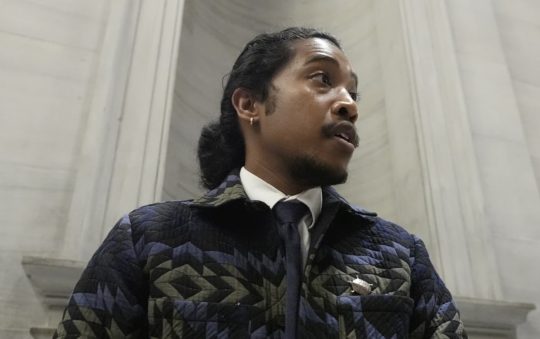An American Music Legacy at The Grammy Museum

As I entered the Grammy Museum at L.A. Live in downtown Los Angeles, I was gripped with excitement. I saw exhibits featuring Michael Jackson, Taylor Swift, Myles Davis, Madonna, Shirley Cesar, BB King, Marvin Gaye, The Beattle’s, Jimmy Hendrix and countless others featured in different corners of the museum.
Having been there before I had experienced a very informative lecture about the life of iconic Reggae legend Bob Marley. As my family and I arrive and proceed up the elevator we didn’t know what quite to expect. As soon as I enter I know right away this place is the real deal. Represented are evolutions of Grammy Award trophies over years in chronological order. With reels of stars such, as Will Smith and Madonna playing on the walls in the background.
As we move through the threshold we are almost emideitly met with a tribute kiosk to my great grandfather, Huddie (Leadbelly) Ledbetter. There it was, a piece of American music history. A huge display surrounded by everyone who was in some way or the other effected by his music. One of the country’s number one Negros minstrel, he lifted American folk music to a higher plane. His exhibit celebrates the 125th anniversary of his birthday and his contributions to American music, which are still felt today.
Playing the Blues, Folk music, work songs, Gospel song and Negro spirituals. He was a contemporary of Woody Guthrie and Pete Seeger and every bit as essential to our nations folk music treasury. Everyone from Creedence Clearwater Revival, Led Zeppelin, and Little Richard, to Tom Waits, Nirvana, and even Frank Sinatra covered his songs.
Ledbetter was recognized by the National Academy of Recording Arts & Sciences Hall of Fame for his songs “Midnight Special” and “Negro Sinful Songs” as one of America’s most influential Folk musicians.
I can recall the days as a young boy in the country of Morningsport, Louisiana, the same country that fathered Ledbetter so many years before I was born. A sharecropper scraping together a meager living, Ledbetter was raised on land owned by a white man, set out to make a name for himself as a songster. His skill on the guitar made him a great demand at local dances. He strummed his Stella 12 string guitar with authority, improvising as he sang, he soon became a walking old anthology of unwritten folk music.
Born January 20, 1888 a in the Louisiana swampland, Leadbelly grew up in an atmosphere of violence and sexual precociousness to which he contributed more than his share.
His early manhood was spent rambling through Texas doing odd jobs of plowing and cotton picking, where he soon earned a reputation as a great hand with the ladies and in the communities where such fame called for spectacular prowess.

One particular relationship in those days and even now would be considered controversial and embarrassing. At 15 he became an illegitimate father. Ledbetter had a relationship with his cousin, which produced one of his only recognized daughters, Jessie Mae (Ledbetter) Baisley, who living through her current offspring fights till this very day to be recognized and rightfully documented as direct air to the Leadbelly name and estate.
Twice in prison for murder or attempted murder, Ledbetter has twice received national pardons. In December 1917, in a row involving a girl, Leadbelly shot another man dead. He was sentenced to 30 years in a Texas penitentiary and was pardoned in 1925 by Gov. Pat. M. Neff, who heard him strum and sing a petition for pardon. Five years later he got into a stabbing affray with a gang of other Negroes and was shipped to Louisiana State Prison farm for assault with intent to murder.
There, in the summer of 1934, John A. Lomax, eminent ballad collector who was searching for folk songs to be recorded for the Library of Congress recorded another petition for a pardon which Leadbelly sang to Governor O.K. Allen. Lomax sent the record to the musical Governor Allen who promptly pardoned the persuasive petitioner.
In December 1934 Leadbelly moved to New York. Money and fame going to his head in 1935 he went back to Louisiana with his new wife, Martha Promise who was also his manager.
After a brief stay, he returned to New York, where he continued singing and playing on the radio entering a new prosperous period.
Ledbetter’s wife was informed in New York Dec 5 1949, via Western Union that her husband Huddie Ledbetter had died in Bellevue Hospital at 1:50a.m. Leadbelly’s obituary was featured in the New York Times days after his death.
Ledbetter also lived in Los Angeles for a time and still has offspring there today. Some of which were present for our visit; Vernita Dixon (grand daughter), Vernita Baisley (great grand daughter), Tanisha Baisley, (great grand daughter), Marcus Baisley, (great grand son), and Jeffery Wadley (great grand son), were just a few of the family visiting on this day.
The Leadbelly exhibit will be on display through May 2015. For more information on exhibit dates and times contact the Grammy Museum at L.A. Live Los Angeles.






